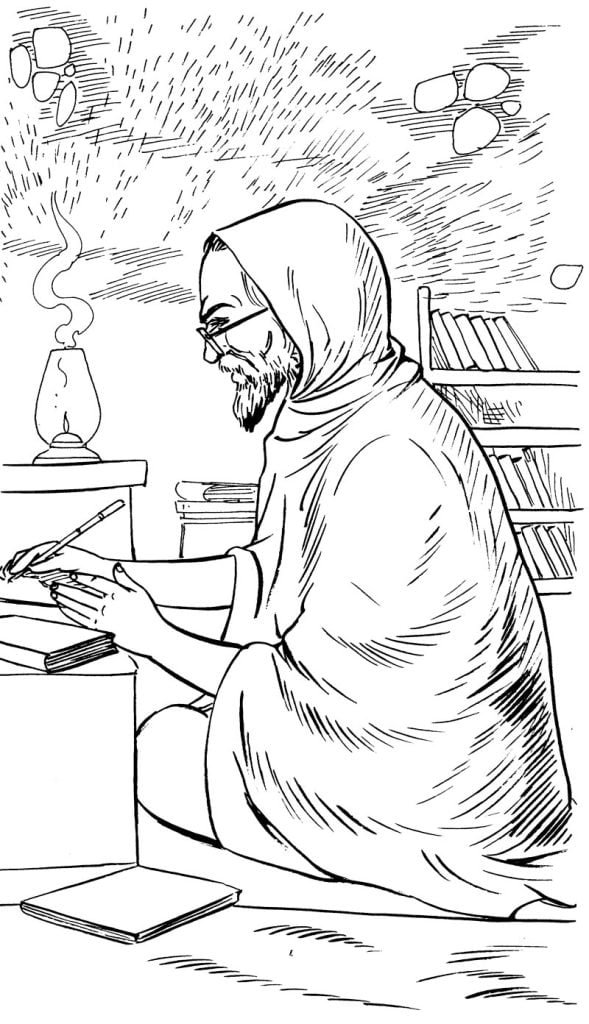He had done some contemplation on service in Dhulia jail and felt that India was the land of villages. Without the upliftment of villages the country could not make progress.
He believed that the rural population was the living manifestation of Lord Shiva. Serving the rural folks, thus, meant worshiping Shiva. Meanwhile, the government had confiscated the ashram property of Vardha. Vinoba had to start afresh somewhere. It was time to move towards villages.
Vinoba explored the rural area around Vardha. At last he decided to make Nalwari, the centre of his village services. Nalwari was a Harijan village. The inhabitants were extremely poor. Vinoba interacted with the villagers to know their problems after sweeping the village streets clean as introduction of his noble intentions. Vinoba set up an ashram just a stone throw away from Vardha Ashram. The ashram was a make shift structure consisting of two huts, one for living and the another to serve as kitchen-cum-store. Between the two huts there was a courtyard. Some distance away stood, latrine and bathing hut. Four male workers and three female students lived with Vinoba there. The discipline was as strict as ever. In the mornings the inmates and Vinoba would go to Nalwari village and sweep the streets.
Later, workshops were opened in the village to teach the rural folk cottage crafts, poultry breeding and hygiene. Vinoba had a good number of dedicated workers. In due course several village service centres were opened which were manned by workers. Every fortnight the workers of those centres assembled at Nalwari centre to give progress reports, to recount their problems, experiences and demands. The problems were discussed and the solutions worked out. The each centre took care of programmes in 50 villages. Vinoba’s workers sunk 245 wells in villages.

On 1 January, 1933 Vinoba wrote a letter, to Gandhiji—
In the sacred service of Bapuji.
Nalwari is a Harijan village 1½ miles off Vardha. On 25th I shifted here remembering God’s name. I would be 12 years since Vardha Ashram was founded. A term is over. Good experience. Doer feeling is gone. It is all God, such realisation dawned.
Infact, all those years I lived not at Vardha. I was in your command. In this world there is nothing for me except your blessings. I can say that all those years I continuously tried to fulfil my austerity resolves. But I sense some deficiency. The volume of faith I have in God falls short in comparison to the kindness He bestows on me.
I know that you have fully covered me with your blessings but still I write this letter to seek the same. Please take charge of this humble servant of yours. Get God bless me to be worthy of the instrument of your worthy cause. Give me your command, if any.
Vinoba’s humble salutations
Gandhiji responded with a tearful note—
‘Long live Vinoba,
Your faith and devotion brings tears to my eyes. I may be qualified for it or not, but you will pass, you will be an instruments of a great service. You shifted to Nalwari, it was alright.
As for future command—Do not think of reducing milk intake for the time being. Take care of yourself. Currently our duty is to work for eradication of untouchability etc.
What I keep writing…I find little time to read that. Keep writing. A letter a week should be enough.
Blessings of Bapu
Due to overwork Vinoba fell sick in 1938. When his condition aggravated Gandhiji instructed Vinoba to shift to Pavnar, a salubrious place where Seth Jamnalal had a kothi, a few kilometers away.
Pavnar bungalow of Jamnalal was situated near the confluence of Pavnar and Dham rivers. As it was across Dham Vinoba named his camp ‘Paramdham’ literally meaning ‘Heavenly Abode’.
